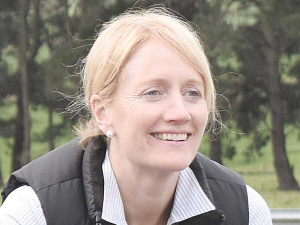DairyNZ Levy Vote Underway as Chair Highlights Seven-Fold Return
Voting has started for the renewal of DairyNZ's milksolids levy.
 North Otago farmer Jane Smith says industry-good bodies need to come together and serve the sector better.
North Otago farmer Jane Smith says industry-good bodies need to come together and serve the sector better.
North Otago farmer Jane Smith believes continual appeasement to government by industry-good bodies is not serving the sector well and it's time for a mega-merger of primary sector advocacy groups.
She told Rural News a 'come to Jesus moment' is needed with DairyNZ, Beef+Lamb NZ and Federated Farmers combining into one strong, coherent farm sector group.
Smith cites the recent performances of both Beef+Lamb NZ and DairyNZ over the reforms to freshwater regulations and proposed greenhouse gas rules as leaving farmer levypayers dismayed, disappointed and feeling abandoned by their representatives.
Smith acknowledges the increasingly unpalatable 'low or no' consultation processes in the current political environment, but sees this as a catalyst to ensure one united front for primary industry advocacy is formulated, rather than an excuse for poor outcomes.
She says this has opened the door for movements like Groundswell NZ to fill the gap. She believes that movements such as Groundswell shouldn't be seen as threatening to industry advocacy bodies, but as an opportunity for all stakeholders to air grassroots concerns and has seen first-hand opportunities presented at meetings.
"I found it enlightening to see farmers, councillors, mayors, rural servicing reps, politicians and the Rural Support Trust having the opportunity to be in the one room at the same time and chew the fat on issues at a grassroots level," Smith told Rural News.
She says the ideal journey would have been to have this dialogue long before the National Policy Statements on freshwater, biodiversity and carbon were formulated.
Smith cites the delay in Wintering Rules as an example of this and congratulates the working group tasked with looking at these regulations closer.
"However, if it weren't for two farmers standing up [Federated Farmers leaders, Geoffrey Young and Bernadette Hunt] and saying 'enough is enough' then the working group would never have been formed. It shouldn't take individuals to go out on a limb to get action," says Smith.
"As an industry, we need to be crystal clear on a line of sight for both the environment and the economy and the vast difference between pragmatic policy and misaligned, misinformed, mediocre outcomes".
Controls on the movement of fruit and vegetables in the Auckland suburb of Mt Roskill have been lifted.
Fonterra farmer shareholders and unit holders are in line for another payment in April.
Farmers are being encouraged to take a closer look at the refrigerants running inside their on-farm systems, as international and domestic pressure continues to build on high global warming potential (GWP) 400-series refrigerants.
As expected, Fonterra has lifted its 2025-26 forecast farmgate milk price mid-point to $9.50/kgMS.
Bovonic says a return on investment study has found its automated mastitis detection technology, QuadSense, is delivering financial, labour, and animal-health benefits on New Zealand dairy farms worth an estimated $29,547 per season.
Pāmu has welcomed ten new apprentices into its 2026 intake, marking the second year of a scheme designed to equip the next generation of farmers with the skills, knowledge, and experience needed for a thriving career in agriculture.

OPINION: Here w go: the election date is set for November 7 and the politicians are out of the gate…
OPINION: ECan data was released a few days ago showing Canterbury farmers have made “giant strides on environmental performance”.